Hip injuries are common in the workplace and can be seriously disabling. If you believe that you have suffered an injury in your workplace, it’s important to get the care and representation that you deserve by contacting our workers’ compensation lawyers at Gearhart Law Group.
If you’re dealing with a new hip injury, the process of connecting your injury to your current Georgia workplace or work history can be exceptionally complicated and challenging. However, with the help of our specialized workers’ compensation lawyers, you can rest assured that your case will be handled with care and persistence.
Is My Workplace High Risk for Experiencing Hip Injuries?
Injuries to the hip can happen to anyone, regardless of their profession. However, work that requires large amounts of walking, driving, and heavy lifting puts you at an increased risk for a hip injury because of increased stress on the hip joint and potential for accidents while at work. Some professions more likely to experience hip injuries include construction, plumbing, and delivery driving.
At Gearhart Law Group we commonly represent these Georgia workplace hip injuries:
- Arthritis
- Labral tear
- Hip fracture
- Muscle strain or rupture
- Hip bursitis or tendinitis
If you’ve experienced a hip injury while at your Georgia workplace, or think your recent work history caused your hip injury, contact the Georgia workers’ compensation lawyers at Gearhart Law Group. We can help you connect the dots, give you the representation that you need, and help get you the best treatment for your recovery.
What Hip Injuries Are Common At My Georgia Workplace?
The hip joint is a connection between the head of your femur (thigh bone) and your pelvis at a deep socket called the acetabulum. The hip joint is designed to support the weight of your upper body and allow for more bending and twisting during movement.

Because some jobs involve frequent walking, getting in/out of vehicles, and bending or twisting, they can put you at increased risk for a hip injury. Some hip injuries develop slowly over time due to repetitive stress and positions, while some occur suddenly during an accident such as a slip or fall at your Georgia workplace.
Whether your injury is chronic (slowly developing) or acute (accident-related), it’s important to seek medical treatment. Seeking diagnosis and treatment for your problem not only improves your success on the road to recovery, but also provides essential information related to your injury claim.
Common Hip Workplace Injuries
Arthritis
The term arthritis describes inflammation and pain within joints of the body. While there are several forms of arthritis, two are fairly common: osteoarthritis (OA) and rheumatoid arthritis (RA). In most cases, osteoarthritis (OA) is more likely to be caused by your work duties.
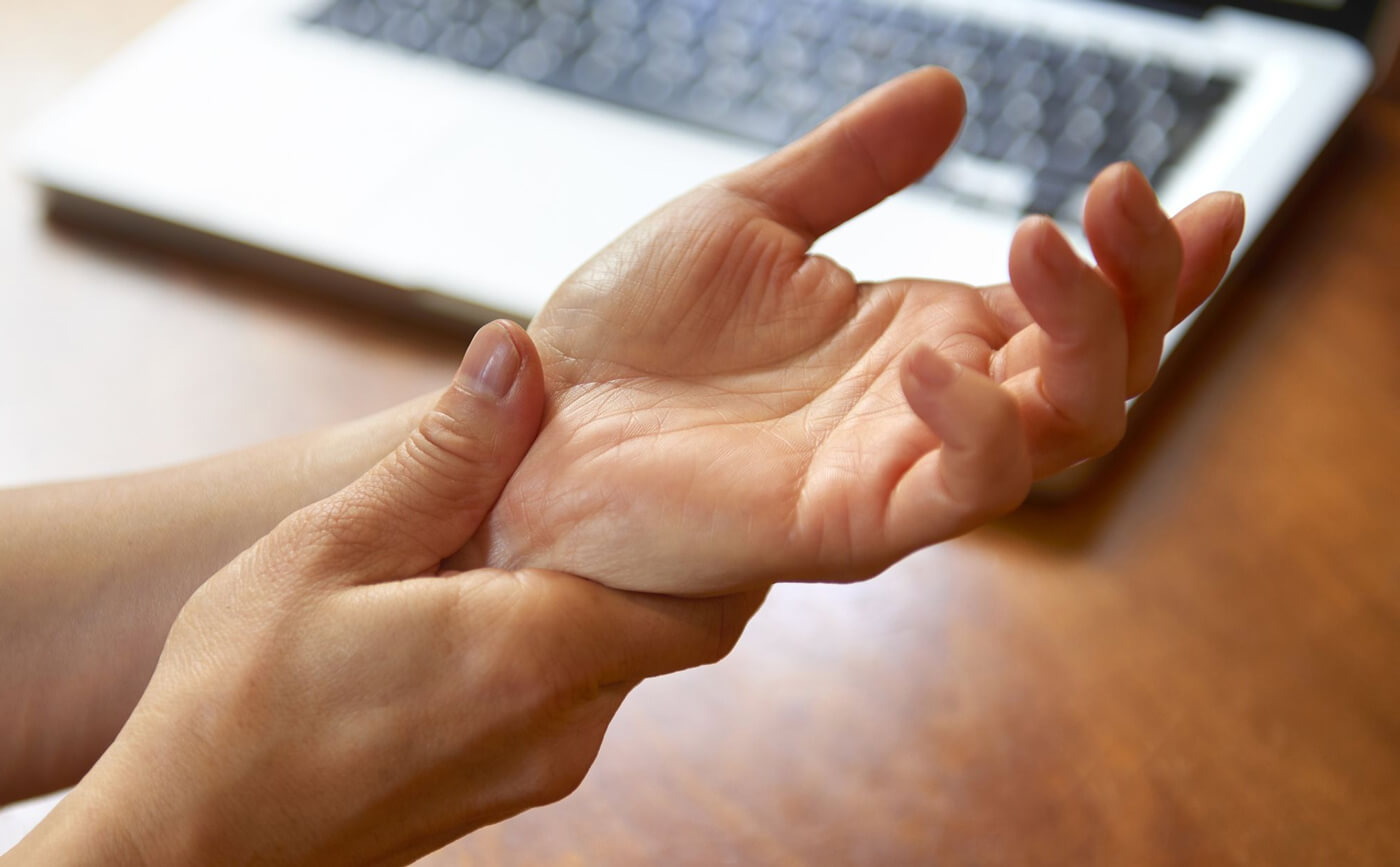
Most of us will slowly develop some amount of OA throughout our lifetime, particularly going into advanced age. However, repetitive stress on joints due to awkward or heavy movements can speed up the process, eventually leading to OA of the affected joints much faster than with normal joint use.
Symptoms of OA in the hip typically include pain and stiffness with motion, usually worse in the morning, and progressive loss of certain motions such as bending your hip behind your body (extension) and rotating your hip inward (internal rotation). OA can easily be diagnosed using an X-ray.
Labral Tear
Similar to the shoulder joint, your hip joint is lined with a fibrocartilaginous pad known as the labrum. The hip labrum’s main functions are providing padding for shock absorption and facilitating smooth motion of your hip joint.
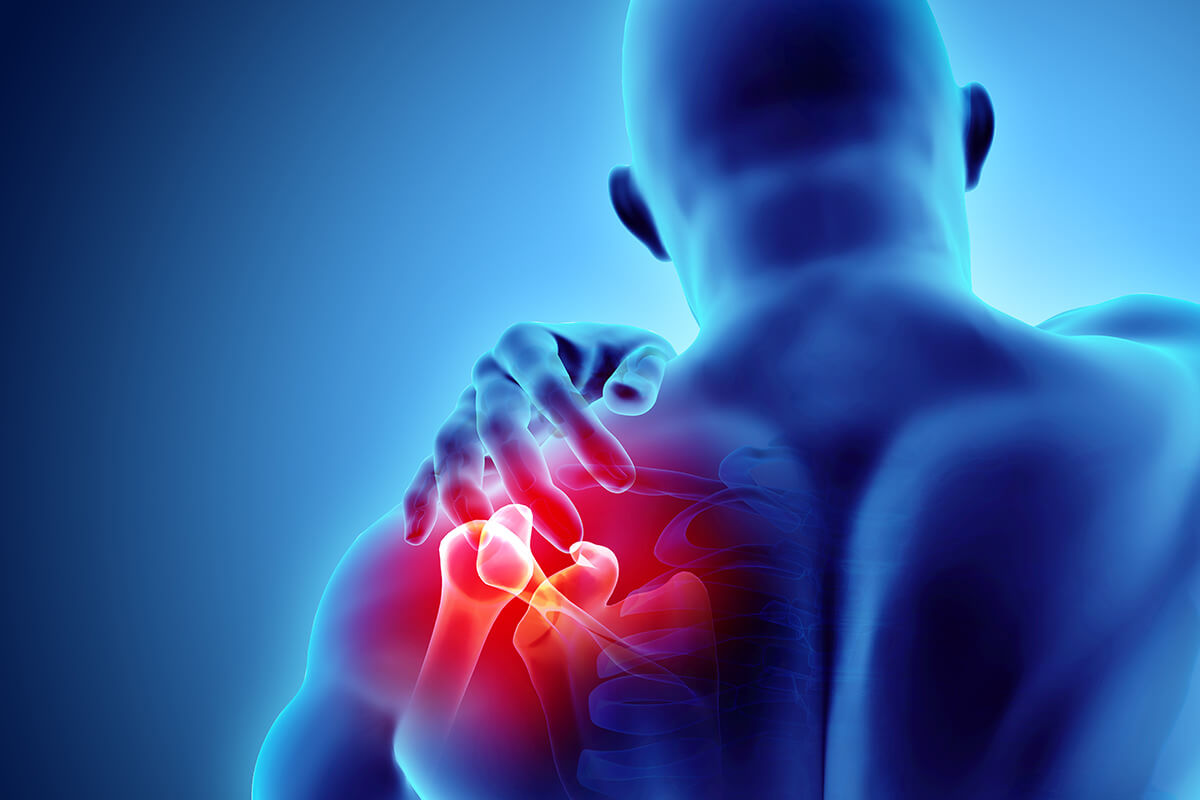
The hip labrum can become torn during a heavy, fast, or otherwise uncontrolled twisting motion at work. Symptoms of a labral tear include pain in the groin or front of the thigh, painful or weak hip movement, and catching or locking of the hip during walking, bending or twisting.
Because the labrum is a very deep structure, a labral tear must be diagnosed using advanced medical imaging such as MRI. However, your doctor may recommend an X-ray to initially rule out a hip fracture.
Hip Fracture
Fractures of the hip usually occur at the femur, but can also occur at the pelvis. Some common hip fractures in the workplace are stress fractures of the femur or pelvis, femoral neck fracture, and compound fractures of the femur.
Stress fractures (also called hairline fractures) are small cracks in the bone that develop due to stress. These may develop during an accident, or slowly with repetitive and excessive stress to the pelvic bones or femur.
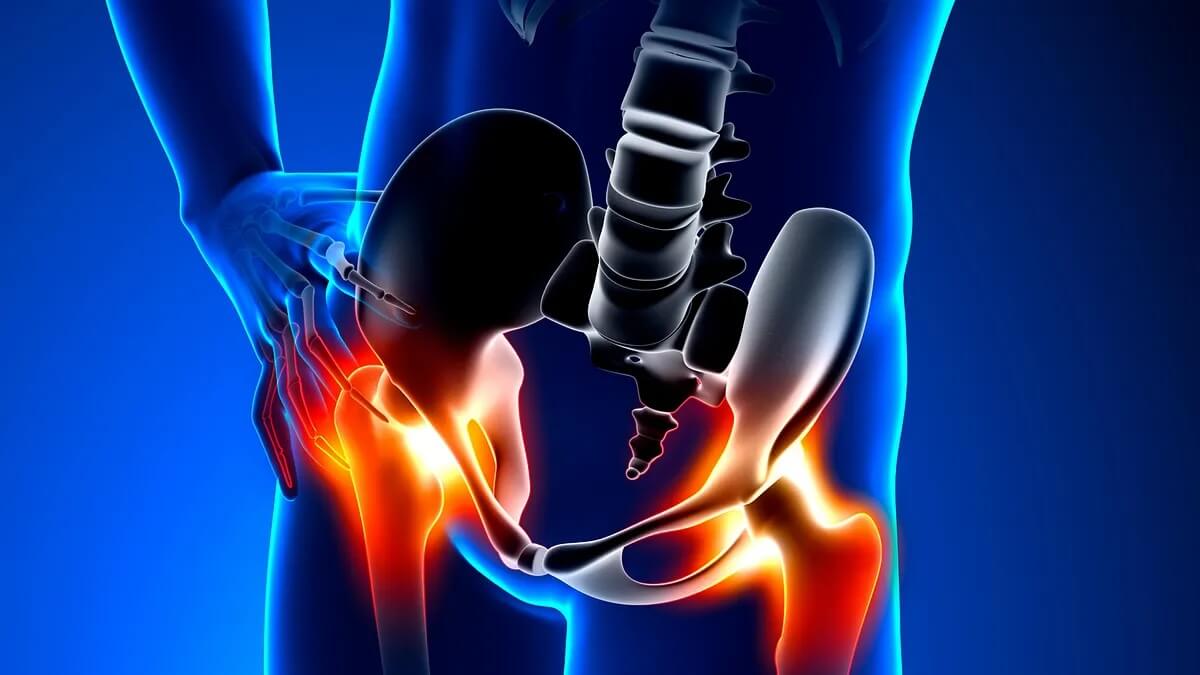
Femoral neck fractures occur when bone connecting the femoral head and shaft, which is especially vulnerable to injury, is overloaded. These are among the most common hip fractures and usually occur during a direct fall onto the hip.
Compound fractures (also called displaced open fractures) describe full breaking of the femur with opening of the skin due to displacement of the bone. This is a very severe injury that requires immediate emergency medical attention and long-term rehabilitation.
All fractures should be taken seriously and must be accurately diagnosed using medical imaging such as an X-ray. If you think you have fractured your hip, contact your doctor immediately.
Muscle Strain or Rupture
There are many muscles that cross the hip joint to facilitate movement or your hip. Some commonly injured muscle groups include your hip flexors, adductors, and hamstrings.
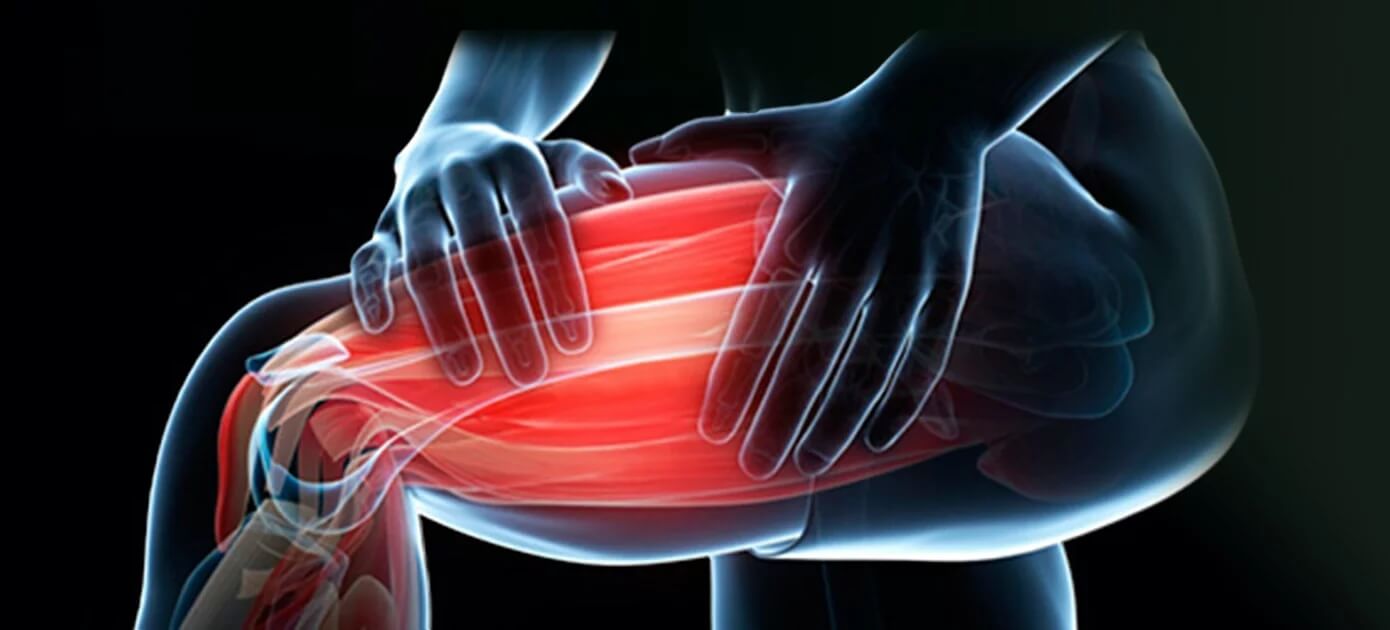
During a sudden pushing, kicking, or twisting motion at work, a hip muscle or its tendon may become strained (injured) or ruptured (torn). In many cases these injuries occur due to repetitive strain and overuse of hip muscle over time, which primes it for injury during a single movement. In some cases the muscle tendon may pull a fragment of bone off, known as an avulsion fracture.
Symptoms of a muscle strain typically include painful use of the affected muscle, tenderness over the injury site, and weakness of the movement facilitated by the muscle. In cases of a full rupture, the injury may be painless with profound weakness of motion.
The degree of a muscle or tendon injury is usually diagnosed using magnetic resonance imaging (MRI).
Hip Bursitis or Tendinitis
The hip joint is supported by several fat pads (bursae) and muscle tendons. Fat pads of the hip provide padding and insulation, while tendons provide stability and facilitate hip motion.
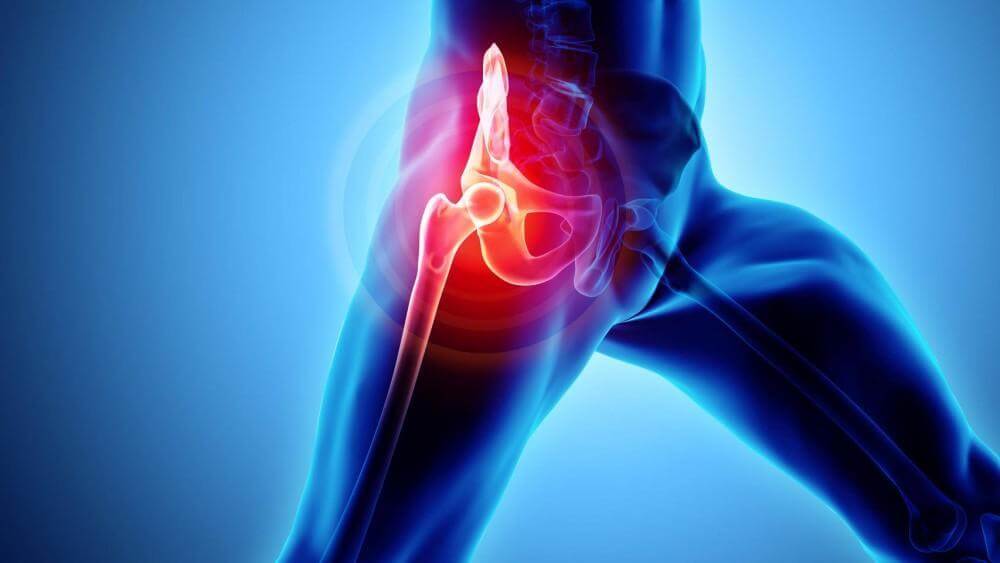
When a bursa or tendon is consistently overstressed, it can become inflamed. Symptoms of an inflamed bursa (bursitis) or inflamed tendon (tendinitis) are typically painful movement of the hip, especially during position changes and going up or down stairs. In many cases, there will be profound tenderness of the affected tendon or bursa.
A very common hip injury is trochanteric bursitis, where the bursa covering the greater trochanter of the femur (the distinct “hip bump”) becomes irritated and inflamed. This condition is characterized by severe tenderness of the trochanter and painful, weak hip motion.
Depending on the severity of bursitis or tendinitis, diagnosis may be possible with MRI. However, in many cases imaging is not required for diagnosis. Your doctor may recommend an X-ray to rule out a stress fracture of the hip.
Can My Hip Injury Be Treated?
Most hip injuries are entirely treatable with the expectation of full or partial return to work. Your specific outcomes will vary depending on the nature and severity of your diagnosis, but establishing a treatment plan is the first step for recovery and completing your workers’ compensation claim.
For most injuries, your doctor will recommend physical therapy to treat your hip injury and help you maximize your ability for returning to work. Treatments in physical therapy may involve passive interventions such as massage or electrotherapy, but most treatment plans will focus on progressive exercise to maximize range of motion and strength in your hip. Your medical doctor or physical therapist may also recommend adaptive equipment such as a knee brace or crutches to help with your recovery.
For injuries with poor response to physical therapy, a steroid injection may be used to reduce inflammation and facilitate more effective participation in physical therapy. Serious injuries such as severe OA, compound fractures, and labral tears will likely require surgery. Common surgeries for the hip include arthroscopic repair, hip resurfacing, and total hip arthroplasty (replacement).
Arthroscopic hip surgery is an outpatient procedure performed under general anesthesia. This surgery is usually performed to repair a labral tear, trim down bone, or remove dysfunctional tissue in the joint.
Total hip arthroplasty is performed to replace segments of the hip joint when they are damaged beyond repair. The main purpose of this surgery is to alleviate debilitating hip pain and loss of function, usually due to advanced OA, that has not been resolved with physical therapy or injections.
It is common to require physical therapy for you to regain normal use of your hip after a surgery. You will also likely be prescribed medications for pain or other symptoms after surgery. All of these costs should be paid for by your employer if your injury is work-related.
Compensation and Benefits for Hip Injuries in Georgia
In addition to paying for your medical bills and costs, your employer may also owe you additional compensation for your hip injury. If your injury is severe enough to require surgery, then you will be unable to work for a period of time determined by your doctor. If this period of time is longer than seven days, your employer is required to pay you temporary total disability for the time you are off work.
Temporary total disability payments are issued to you at a rate of two-thirds of your average weekly wage. If your accident occurred on or after July 1, 2022, this benefit is capped at a payment of $725 per week.
You may also receive compensation for the permanent nature of your injuries. This is called permanent partial disability. These benefits are calculated based on an impairment rating that is calculated by your treating physician.
Returning to Work with Light Duty Work Restrictions
If you have work restrictions that limit your ability to perform the work you were doing prior to your hip injury at work, your employer may be able to accommodate those restrictions and offer you a job that you can perform with your temporary limitations. Your employer is not required to offer you a job within your restrictions—but if they are unable to, they must pay you temporary total disability until your doctor determines that you are released to go back to full duty work.
In some cases, these light duty jobs pay less than what you were earning in your prior position. Under Georgia workers’ compensation law, you may be owed additional compensation of two-thirds of the difference in wages. This benefit is currently capped at $483 per week as of July 1, 2022.
Work Accident Hip Injuries in Georgia
If you have recently suffered a hip injury in a work accident in Georgia, Gearhart Law Group is here to help. Contact us today for a free consultation to get started pursuing your workers’ compensation benefits. Unfortunately, it is complicated navigating the workers’ compensation panel of physicians. The Georgia Workers’ Compensation system requires injured workers to select a doctor from a small panel of physicians. In some cases, the panel will have valid doctors who understand your injury. In other cases, the panel is invalid due to a variety of reasons. It is important to speak with a workers’ compensation attorney to understand the rights of the injured worker.
Free Consultation
If you have a hip injury and need legal advice, contact the best workers’ compensation attorney in Georgia. Beth Gearhart listens and cares about her clients. Beth is available every day to discuss your case and provide you with your options. She is dedicated to positive outcomes and only gets paid if you receive a settlement. You do not need to pay anything up front to discuss your case and explore your options.

